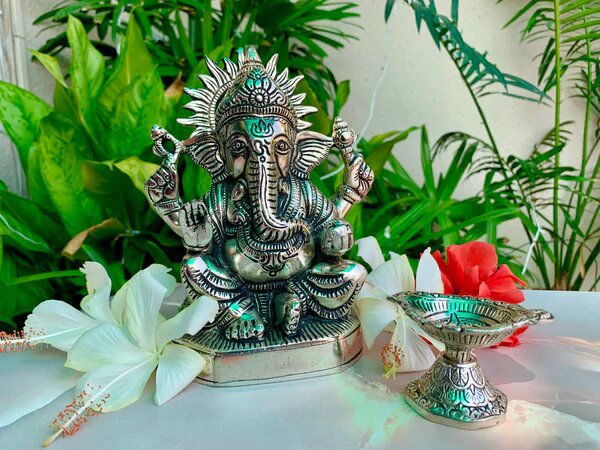According to Hindu mythology, Ganesh, the elephant-headed god, is worshipped as the remover of barriers and the personification of prosperity and wisdom. Because of his charming demeanor and profound meaning, he is one of the most adored and extensively revered deities worldwide. Hindus around the world have a long-standing custom of worshipping Ganesh idols before other Gods. Countless devotees also decorate their homes and temples with beautiful depictions of the adored god.
But did you know that Ganesh is known by different names in different parts of the world? And it’s possible you may hear different names of Ganesha as you move from one state to another in India. For your information, ‘Ganesha’ is just another variation of Ganesh; it’s not another name.
Names of Ganesha You Probably Didn’t Know About
There are many other names for Ganesha, which reflect both his complexity and beliefs surrounding him. His most well-known names are:
Vinayaka: “Remover of obstacles”
Ganapati: “Lord of the ganas” (semi-divine beings)
Vighneshwara: “Lord of obstacles”
Siddhivinayak: “Giver of success”
Dvaimatura: “One who has two mothers”
Dwimuka: “Lord with two heads”
Pramukha: “Supreme Head of the Universe”
Sumukha: “Auspicious Face”
Kriti: “Lord of Music”
Supradeepa: “Radiant Light”
Sukhanidhi: “The God who gives happiness and money”
Suradhyaksha: “Sovereign of the Gods”
Surarighna: “The Destroyer of the Enemies of Devas”
Mahaganapati: “Omnipotent and Supreme Lord”
Manya: “Respectable”
Mahakala: “The Great Time”
Mahabala: “Enormously Strong Lord”
Heramba: “Mother’s Beloved Son”
Lambajathara: “Big Bellied”
Haswagriva: “Elephant-necked”
These names of Ganesha capture the different facets of Ganesh’s character and his place in the Hindu pantheon. They are a source of great respect and devotion since they serve as a constant reminder of his omnipotence, wisdom, and kindness.
The differences in names of Ganesha can also be seen in Ganesh idols crafted across India. In some parts, devotees worship a child-like idol of Ganesha, while in others, a Ganesh idol with a big-belly is more common. Similarly, the type of material with which the idol is made varies.
The Exquisite Craftsmanship of Ganesh Idols
Various materials like clay, metal, and precious stones are used to make Ganesh idols, also called Ganesh murtis. Every idol is painstakingly carved to capture all the fine aspects of Ganesh’s body, including his magnificent elephant head and elaborately decorated crown. These idols are an enthralling work of art and a potent symbol of divine grace because of its rich decorations and vivid hues.
The Profound Symbolism Embedded in Ganesh Idols
The meaning attributed to Ganesh idols is deep and complex. The elephant head of Ganesh is a symbol of power, intelligence, and the capacity to conquer adversity. His four arms stand for his omnipresence and his capacity to shield his followers from all sides. The ladoo, a delightful treat he carries in his trunk, represents wealth and the richness of life’s blessings. His vahana or chariot, the mouse, stands for the capacity to overcome negativity in the mind.
The Significance of Ganesh Idol Placement
Ganesh idol placement is also said to be important. In order to greet guests and create a hallowed environment, they are frequently positioned at the entrances of houses and temples. In an effort to invoke Ganesh’s blessings for success and wealth, the idols are also positioned in cars, workplaces, and shops.
Ganesh idols are seen as living things, endowed with heavenly energy, and not just ornaments. Pranapratishtha, the procedure of consecrating a Ganesh idol, entails enlisting the god’s presence within the idol via rites and prayers. After being dedicated, the idol becomes a source of awe and devotion and provides a concrete link between the worshipper and the divine.
The Enduring Allure of Ganesh Idols: A Constant Reminder of Divine Virtues
The worship of Ganesh idols is not confined to specific occasions or festivals. Devotees offer daily prayers, light incense and offer prasad, a food offering, to express their gratitude and seek blessings. During festivals like Ganesh Chaturthi, the idols are taken in grand processions, culminating in a symbolic immersion ceremony, representing the dissolution of the ego and the return of the divine to its source.
Summary
More than just sculptures, names of Ganesh and his idols are living examples of faith, devotion, and the continuing power of Hindu iconography. They act as a continual reminder of his virtues, encouraging followers to pursue wisdom, conquer challenges, and enjoy the sweetness of life’s blessings.










